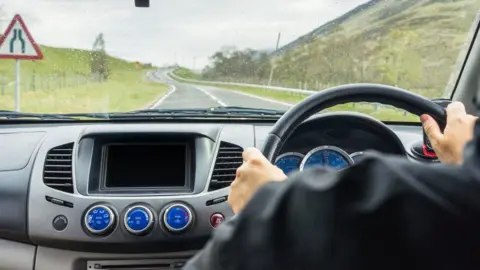Drivers 'should have compulsory eye tests'
 Getty Images
Getty ImagesDrivers should have compulsory eye tests every 10 years, the Association of Optometrists has said.
One in three optometrists say they have seen patients in the last month who continue to drive with vision below the legal standard, their association said.
Motorists must read a number plate from 20m (65ft) in the practical driving test, but there is no follow-up check.
The Department for Transport said changes to eyesight should be reported by motorists to the DVLA.
"All drivers are required by law to make sure their eyesight is good enough to drive," a spokeswoman said.
Data from the Department for Transport shows seven people were killed and 63 were seriously injured in accidents on Britain's roads last year when "uncorrected, defective eyesight" was a contributory factor.
'Outdated laws'
Nine out of 10 optometrists believed the existing rule - that put the onus on motorists to report themselves to the DVLA if they develop eyesight problems - is insufficient.
When drivers pass the age of 70, the emphasis changes a little. Drivers must actively make a declaration every three years that they are fit to drive. As part of that they must confirm that they meet the minimum eyesight requirement.
Brenda Gutberlet, whose 28-year-old niece Natalie Wade was killed in 2006 by a 78-year-old driver who was blind in one eye, says she wants the "outdated laws on drivers' medical fitness" changed.
Ms Gutberlet, from Canvey Island, Essex, said her niece died just months before her wedding and that she does not want other families "to go through what we have".
Optometrist Dr Julie Anne-Little said Britain "falls behind many other countries" because of the initial number plate test and the self-reporting of eyesight problems.
"Because sight changes can be gradual, often people won't realise that their vision has deteriorated over time," she said.
